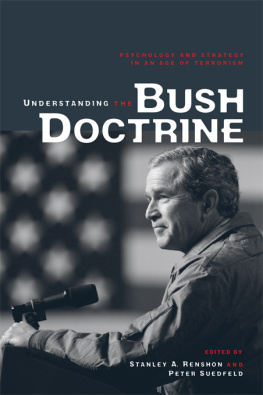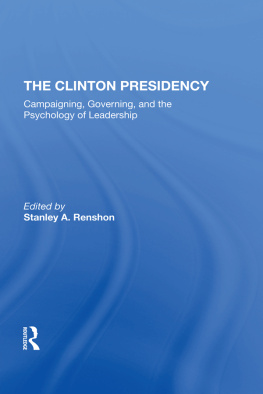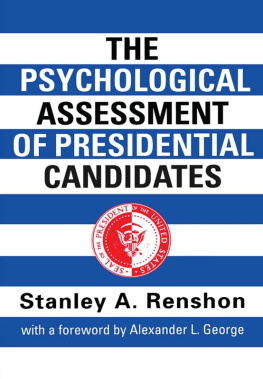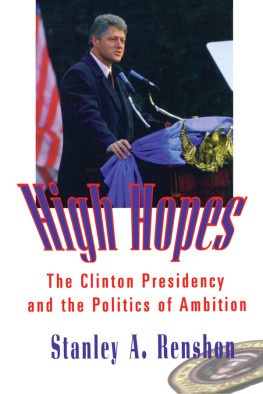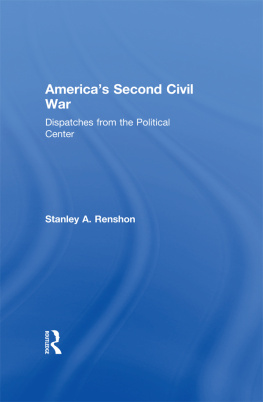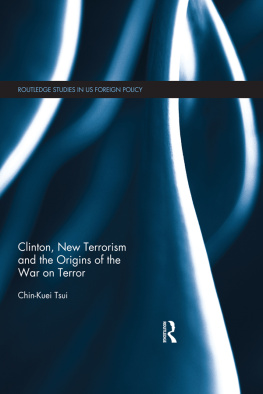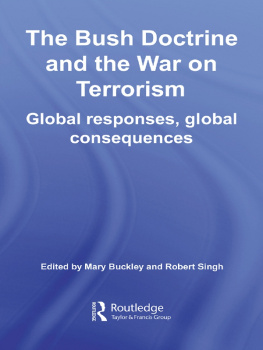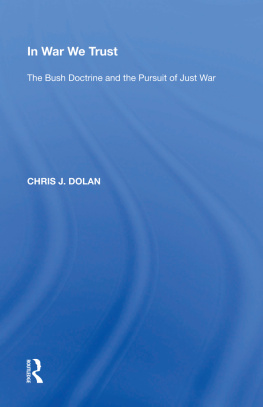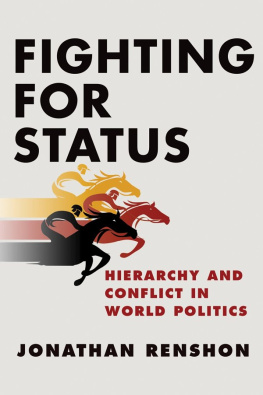UNDERSTANDING THE B USH D OCTRINE
PSYCHOLOGY AND STRATEGY IN AN AGE OF TERRORISM
UNDERSTANDING THE B USH D OCTRINE
EDITED BY
S TANLEY A . R ENSHON AND
P ETER S UEDFELD
Routledge
Taylor & Francis Group
711 Third Avenue
New York, NY 10017
Routledge
Taylor & Francis Group
2 Park Square
Milton Park, Abingdon
Oxon OX14 4RN
2007 by Taylor & Francis Group, LLC
Routledge is an imprint of Taylor & Francis Group, an Informa business
International Standard Book Number-10: 0-415-95504-1 (Softcover) 0-415-95503-3 (Hardcover)
International Standard Book Number-13: 978-0-415-95504-1 (Softcover) 978-0-415-95503-4 (Hardcover)
No part of this book may be reprinted, reproduced, transmitted, or utilized in any form by any electronic, mechanical, or other means, now known or hereafter invented, including photocopying, microfilming, and recording, or in any information storage or retrieval system, without written permission from the publishers.
Trademark Notice: Product or corporate names may be trademarks or registered trademarks, and are used only for identification and explanation without intent to infringe.
Library of Congress Cataloging-in-Publication Data
Understanding the Bush doctrine : psychology and strategy in an age of terrorism / edited by Stanley A. Renshon and Peter Suedfeld.
p. cm.
ISBN 0-415-95503-3 (hb) -- ISBN 0-415-95504-1 (pb)
1. United States--Politics and government--2001- 2. Bush, George W. (George Walker), 1946- 3. Iraq War, 2003- 4. War on Terrorism, 2001- 5. United
States--Foreign relations. I. Renshon, Stanley Allen. II. Suedfeld, Peter, 1935-
JK276.U55 2006
363.32515610973--dc22
2006021851
Visit the Taylor & Francis Web site at
http://www.taylorandfrancis.com
and the Routledge Web site at
http://www.routledge.com
Contents
1 The Bush Doctrine Considered
STANLEY A. RENSHON
2 International Relations Theory Meets World Politics
GERARD ALEXANDER
3 The Convinced, the Skeptical, and the Hostile
DOUGLAS C. FOYLE
4 The New Psychology of Alliances
PETER SUEDFELD, PHILIP E. TETLOCK, AND RAJIV JHANGIANI
5 Illusionary Promises and Strategic Reality
WILLIE CURTIS
6 Deterrence in an Age of Asymmetric Rivals
JERROLD M. POST
7 Preventive War and the Bush Doctrine
JACK S. LEVY
8 The Psychological Origins of Preventive War
JONATHAN RENSHON
9 The Democracy Doctrine of President George W. Bush
MARVIN ZONIS
10 The Bush Doctrine Abroad
ALEXANDER MOENS
11 Anti-Americanism
JANICE GROSS STEIN
12 Premature Obituary
STANLEY A. RENSHON
13 The Bush Doctrine in Perspective
PETER SUEDFELD
Acknowledgments
Every published book owes a debt to the dedicated people who helped make it a reality, and this book is no exception.
The support and encouragement of Robert Tempio, then politics acquisitions editor at Routledge, was instrumental in bringing this book to the Taylor and Francis Group. When he left to pursue another major publishing challenge, the book was placed in the extremely capable hands of Charlotte Roh, who made sure that not a beat was missed on the way to completion. Michael Kerns, recently appointed politics editor at Routledge, has continued to be exceptionally supportive of this project.
Michael Davidson has handled all of the many aspects of the production process with effectiveness and dispatch, and Joanne Yang did excellent work copyediting the manuscript.
In the process of the finding a good home for this book, a number of anonymous reviewers offered their views on a detailed proposal and chapter outline. The book and its editors are much appreciative of the very helpful and thoughtful observations.
We are also extremely indebted to our contributors. They all gave their time and insights in the service of analyzing a controversial policy and helping it become more understandable. In the process, they had to contend with two editors, each reviewing their chapters several times. The ensuing discussions were enormously helpful to us as editors and students of the many issues this book addresses. We thank them for their time and willingness to engage our questions and observations.
It has been a real pleasure for the two editors to work together. We share a long friendship and history of mutual interests that was only strengthened by our work on this book.
Finally, Stanley Renshon would like to acknowledge Judith, a warm, loving, and thoughtful wife, who was together with him in this work, as always. Peter Suedfeld thanks his beloved wife, Phyllis Johnson, who combines her own academic career with being his best editor, ally in the face of political controversy and moderator of his arguments.
Preface
The Bush Doctrine is one of the most consequential statements of national security policy in contemporary American history. It is also one of the most controversial. Not surprisingly, given the scope of its importance and its association with a very controversial president, understanding of the Doctrineits strategic foundations, its psychological premises, and its developmentas it has and continues to unfold in practice, is widely misunderstood and under-examined. It has been variously and erroneously equated with the doctrine of preventive war, imperious unilateralism, and American empire. It is true the Doctrine lends itself to these overly broad and bold characterizations; however, its premises are more thoughtful and its implementation more nuanced than the critics allow.
Certainly, the Bush Doctrine is much wider in scope than any of the singular elements for which it is criticized. It is rather a set of policies that reflect five interconnected strategic elements*:
American PreeminenceThe reality and consequences of the fact that America is the most powerful country in the world, but that power has its limits.
Assertive RealismCentral to the Bush Doctrine is the judgment that when it comes to catastrophic terrorism, the best defense is a strong offensive, including the use, when necessary, of preemption and preventive war.
Strategic Stand-Apart AlliancesThe Bush administration understands the lesson that every administration eventually learns: few allies are supporters on every matter, and all have their own interests, which may or may not coincide with ours on particular matters, as well as the understanding that allies have differing levels of sympathy with and commitment to American national security policies.
The New Internationalism: Selective MultilateralismThe Bush administration believes that international institutions are not currently structured or operating in a way that allows the United States to fully depend on them for vital national security issues. It follows that these institutions must be reformed before they can be depended upon, if ever.
Democratic TransformationHere the Doctrine presents a twist by using an old solution to solve a new problem. President Bush is not the first president to want to make the world safe for democracy, but he is the first to explicitly voice the strategy of using democracy as a tool to transform or neutralize now-dangerous countries.
These five elements provide a general, though not inflexible, framework for this book, housed in four major sections: The Foundations of the Bush ).


